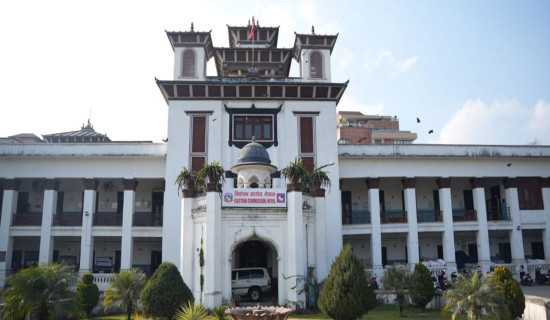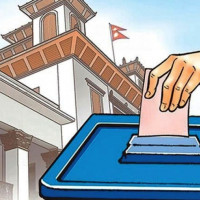- Thursday, 26 February 2026
Private sector contributes 81% to GDP: Report
Kathmandu, May 19: Nepal's private sector's contribution to the national economy is estimated at 81.55 per cent of the Gross Domestic Product (GDP), concluded a recent study 'The state of private sector: Contributions and constraints' jointly published by the Federation of Nepalese Chambers of Commerce and Industry (FNCCI) and the International Finance Corporation (IFC), a member of the World Bank Group.
While the private sector's contribution to Nepal's economy was projected from 71-75 per cent of the GDP so far, the report prepared on the
basis of comprehensive analysis of sectorial data published by the National Statistical Office (NSO), Ministry of Finance, FNCCI and various public and private enterprises has put it at 81.55 per cent, after adjusting the value
addition of all 18 sub-sectors of the national accounts.
However, the report maintained that the overall private sector contribution in 2012/13 was estimated at 86.67 per cent, but has since declined.
This is the first time ever in the history of Nepal that the contribution of the private sector to the national economy is estimated. Minister for Industry, Commerce and Supplies, Ramesh Rijal, launched the report at a programme on Thursday.
According to the publishers, the report analysed data from fiscal year 2011/12 to 2020/21, evaluating the private sector's contribution and current context in Nepal.
The report is first such attempt to create a comprehensive baseline for the entire private sector in
Nepal. The report combines analysis of both published and unpublished secondary data to offer a snapshot of the private sector contributions to the Nepali economy.
Private sector expands 32 times
Earlier, a national Economic Census 2018 conducted by the NSO had concluded that there were 923,356 business establishments in the country. This is a significant growth from 28,660 businesses in the country in 1983, according to the report. This is a growth of 32-fold in the last three decades.
"The private sector is also the largest employer in Nepal, providing employment to 85.6 per cent of the total labour force. A substantial portion of the country’s labour force is employed in agriculture, forestry, and fisheries (57 per cent) and wholesale and retail trade, including vehicle repair (12.5 per cent)," said Chandra Prasad Dhakal, President of the FNCCI.
Industries in these two sectors are primarily driven by the private sector. In 2018, the private sector employed approximately 5.5 million people, while the public sector employed around 427,000 people.
COVID-19 affected 87% businesses
Likewise, the report includes a survey of 517 Nepali firms to gauge the impact of COVID-19 and their awareness of sustainability and climate change. Half of the firms surveyed were in wholesale and retail trade, 13 per cent were in the hotel and accommodation sector, and 12 per cent in manufacturing. Half of the firms had borrowed from commercial banks, and during COVID-19 restrictions, 87 per cent were affected, with 63 per cent fully closed.
A whopping 79 per cent experienced a loss of revenue during the lockdown, but 50 per cent reported being profitable after it was lifted.
Structural reform in economy
Speaking at the report launch programme on Thursday in Kathmandu, FNCCI President, Dhakal, said that there is a need of a structural reform in the economy in order to allow the private sector to function at its full capacity and enhance the ability of the government in spending the capital budget.
According to him, private sector leadership is needed for the sustainable economic development. He demanded that the budget of the upcoming Fiscal Year 2023/24 should adopt a policy of investment expansion, Public Private Partnership (PPP) for sustainable economic development, and creation of skilled human resource.
"We are confident that the country could come out of the economic recession as the external sector has been stable recently. The private sector should be given opportunity in the operation and management of industries and resources in competitive areas," he said.
Support in policy making
Addressing the programme, Minister for Industry, Commerce and Supplies, Ramesh Rijal, said that the report has provided the much-needed basic information needed for private sector-friendly policy making. "Government is ready to address the demand of the private sector and facilitate in every possible way," he said. Babacar S. Faye, Resident Representative of IFC in Nepal, expressed his hopes that the report would help better inform and encourage the dialogue between the public and private sectors in order to formulate the best policies that would unleash the full potential of Nepal’s dynamic entrepreneurs.
"The people of Nepal need jobs, products and services that can only come from a stronger and more productive private sector," he said. "As the first of its kind in Nepal, this report certainly does not pretend to be comprehensive, and we look forward to constructive feedback from all stakeholders in order to enrich the discussions and also improve future editions,” he added.
A joint statement issued by the FNCCI and IFC said that the study revealed that the private sector has played a critical role in Nepal's growth since the restoration of democracy in the 1990s and the implementation of liberalisation, privatisation, and globalisation policies by the government. This has triggered remarkable progress in several industries, including finance, hospitality, tourism, education, and health.
However, the report highlighted certain areas that require improvement, such as simplifying bureaucratic processes, promoting transparency and accountability, improving the reliability and cost of transportation services, and reducing tariffs on crucial imported inputs.








-square-thumb.jpg)

-original-thumb.jpg)





